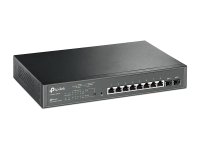For those of you that are deep into the digital forest and are using a switch in your network, I'm curious to know if everyone is using "audiophile" switches or if some people are using commercial switches. If you are using a switch, is it a managed switch or unmanaged switch? If you are using a managed switch, can you tell us what is involved in the initial software setup and if you have to "manage" the switch after the initial setup?
this is the switch you want... tp-link jetStream 8-port Gigabit Smart PoE+ Switch with 2 SFP Slots
> the audiophile part is the 2 SPF ports for running optical fiber to your digital front-end
> the non-audiophile part is that it cost $129.99

